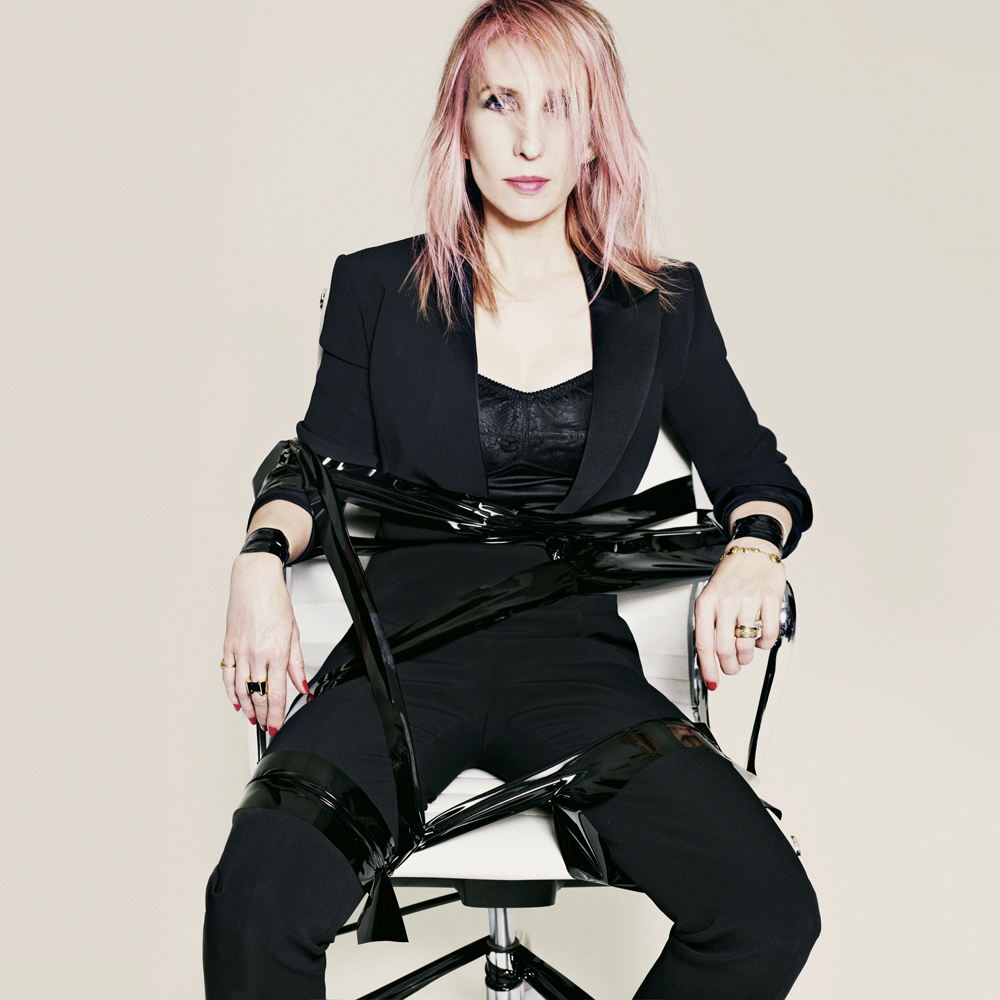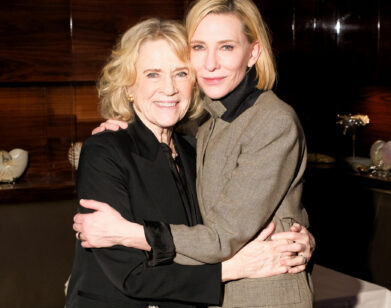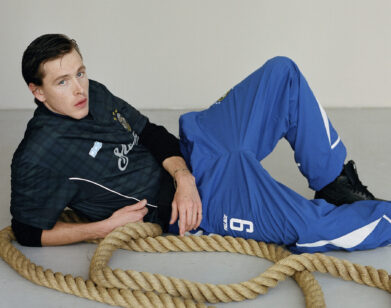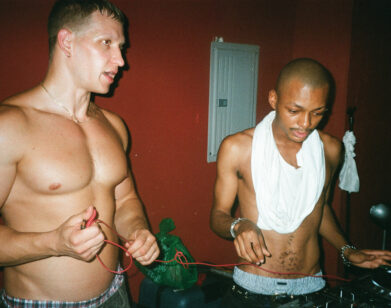Sam Taylor-Johnson
To take something of such magnitude and make it your own is the biggest struggle . . . when you’re trying to be creatively free, which I’m so used to. SAM TAYLOR-JOHNSON
When news broke of a film adaptation of E.L. James’s pulpy pop-erotica novel, Fifty Shades of Grey, the book’s massive and obsessive fan base began immediately clamoring for any and all hints of what was to come, breathless with anticipation, and every one of them with an opinion on the ideal page-to-screen realization. The novel, chronicling the heated courtship between virginal college student Anastasia Steele and her BDSM-enthusiast billionaire beau, Christian Grey, was not just a modern, adult fairy tale of Harlequin romance novel ilk that sold a zillion copies and captured the minds, hearts, and loins of legions of women, but also served as a certain barometer of contemporary sexual appetites.
It was a fitting choice, then, that Sam Taylor-Johnson, the 47-year-old London-born artist and filmmaker, was selected to helm the film. As an artist, Taylor-Johnson, who was nominated for the Turner Prize in 1998, has frequently put the dynamics of gender and sexuality under scrutiny. Her photographic series Crying Men (2002-04) featured celebrity icons of masculinity like Paul Newman, Sean Penn, and Forest Whitaker sobbing, and her video portrait of a sleeping David Beckham, commissioned by the Trustees of the National Portrait Gallery, captured the soccer superstar in a state of raw repose. Her film work—Nowhere Boy (2009), a biopic of the young John Lennon (played by the director’s now-husband Aaron Taylor-Johnson) and the women who shaped his coming of age, as well as the short Love You More (2008), an intimate account of burgeoning teenage sexuality—proved her adeptness at creating stories of emotional and physical intimacy.
For Taylor-Johnson, who cast Irishman and former model Jamie Dornan alongside Melanie Griffith and Don Johnson’s daughter, Dakota Johnson, in the roles of Christian and Ana, Fifty Shades isn’t just about the sex; rather, it serves as a gateway to get to the psychological underbelly of romantic fantasy, expectations, power, and vulnerability.
In January, while working to finish the final edit on the film, which opened on Valentine’s Day weekend, Taylor-Johnson spoke to her friend, the Oscar-winning writer and director Jane Campion. Campion, who was at home in New Zealand, made The Piano (1993), Holy Smoke (1999), and the Sundance Channel’s Top of the Lake (2013), among others, and knows a thing or two about filming a sex scene.
JANE CAMPION: I could probably talk to you for two days. I’m going to start with a really general question—how did it come about that you got involved with Fifty Shades?
SAM TAYLOR-JOHNSON: I started on a completely different movie, a period drama, and I was gearing up to get back to work after taking a good chunk of time out with family. This then got pushed by a year. Mike De Luca, the producer said, “Why don’t you come in? They’re seeing people for Fifty Shades of Grey.” What I felt was interesting about it is that, at the heart of it, it is this dark fairy tale I’ve been familiarized with all my life, and then I’d gotten to read this very adult version of it. I think, in hindsight, they were really hoping for a woman director to handle this material.
CAMPION: One of the things that I’m interested in is the decision—making around the level of sexual explicitness in the movie. The book broke a whole lot of boundaries in terms of what could be popular in the general sense, with anal sex, S&M, bondage … I would have thought—generally speaking—it was too risqué.
TAYLOR-JOHNSON: For some, you mean.
CAMPION: Well, for a book to be that popular. So when it came to the film, what were the discussions around how explicit the sex should be?
TAYLOR-JOHNSON: I think they wanted me to feel unhindered by any restrictions.
CAMPION: You could have penetration?
TAYLOR-JOHNSON: Definitely not that far. [both laugh]
CAMPION: It is kind of an appalling book, isn’t it?
TAYLOR-JOHNSON: It’s pretty strong. I think one of the reasons why they offered it to me is because I made a short film, Love You More, which felt really explicit, but at the same time, you didn’t see anything. It felt like you had seen everything, just from the way I shot it and edited it. It was difficult because we had to think about it in terms of it being a studio movie, so it could never go as far as Blue Is the Warmest Color [2013] or In the Realm of the Senses [1976], where everything is quite explicit. But I don’t really feel like I wanted to go to that extent anyway, because it would take away from the heart of the story. I didn’t want that to be the sole focus.
CAMPION: When I first started reading the book, I thought, “Boy, this is so badly written I can hardly believe it.” There were so many infantile oh golly, oh goshes—almost like a teenager writing. But at the same time, as the book went on—I skipped to the end—I realized, actually, it had a lot of depth to it. A surprising amount …
TAYLOR-JOHNSON: Of emotion.
CAMPION: Of depth and weight. It’s a bit like Blue Velvet [1986] in that you’ve got these kind of corny characters, but they’re going through some very deep shit.
TAYLOR-JOHNSON: You get pulled into the intensity of what their relationship is, and how it starts is so unconventional and so strange, and you can’t help but sort of get curious and aware.
CAMPION: It’s such a fantasy. It’s a kind of corny female fantasy, in a way.
TAYLOR-JOHNSON: All the gifts and promises, the successful man.
CAMPION: In my book, love is about trust and attention. In this story, it’s ritualized into bondage and S&M.
TAYLOR-JOHNSON: What I found really interesting about this was that it started with two people falling in love, one entering into the very unconventional world of another. That unconventional world is something that Ana wanted to be a part of in order to be a part of the relationship, and as they go through it, it becomes her sexual exploration, until we get to the point where she says, “Show me what you really want to do.” At that point, it breaks the relationship. The allure of it is over in the minutes of him expressing what he would really want to do to her. I found that really interesting, that buildup of fantasy of “This is what every woman wants,” until the point where it’s so extreme and so extraordinarily violent that it’s not what anyone could withstand. It feels like at the beginning she’s falling victim to someone’s charms and success and gifts. I like the fact that, by the end, the power shift has completely turned. She has the power because she’s won him over emotionally, which he never thought anybody could do. She walks away from being the victim of a scenario and is empowered.
CAMPION: I think it opened up a whole well of women to understanding sexuality beyond what’s sometimes called “flower sex.”
TAYLOR-JOHNSON: Also how to use it as their own empowerment in allowing to play with roles—submissive or dominant.
CAMPION: I’m very interested in those roles and those ideas, which are not really fashionable for feminists, but I think that part of the nature of love in general is that it is necessary for both partners to submit. It makes a man a man to submit to the feminine, and vice versa.
TAYLOR-JOHNSON: I met with dominants in the world of BDSM and it was really fascinating how strong and strict the boundaries are to create a safe environment, so much so that it’s contractual. The very powerful dominatrix woman that I met, who existed in a kind of Christian Grey world with very wealthy clients, said it created such a powerful bond of trust and such a love within the room, because you’d both been to such a dangerous place on a journey together.
CAMPION: It all hinges on the trust. Also, I know you meditate, but I’m also really interested in ancient religious philosophy. One of the really big ideas is that seeking pleasure and the avoidance of pain is a main entrapment of life. [laughs]
TAYLOR-JOHNSON: Absolutely. I think that’s what they find attractive—to face your fears to the extreme and to be able to experience those things, fear, pain, and pleasure, all in the same environment.
CAMPION: When I met you, I was really struck by how beautiful you are. You have a curious strength and humanity, kindness, and vulnerability. I know you must be ambitious, but there’s nothing of the male-directed machine about you. Clearly you have your opinions, but you’re not at all aggressive in your manner. Is that how things work with you on the set with your collaborators, as a director? How do you get what you want?
TAYLOR-JOHNSON: With a movie like this, I had to build trust and make Dakota and Jamie feel secure that they’d never be violated or put in a position where I was going to take advantage. I had just a few weeks to build an enormous security blanket around the three of us. Whatever we did was a discussion and a place of love and safety. Not too far from what we were talking about, really.
CAMPION: With Dakota, it’s easy to understand, because women are so used to being objectified sexually, but for Jamie, was that a struggle for him at all?
TAYLOR-JOHNSON: I think Jamie was definitely a little shy. His wife, Millie, just had a baby about four days, I think, before we started shooting. To be in the head space of a new father, very protective of the world, and then to step into this role of powerful dominant—it took enormous courage for him to be able to do that and be naked and be sexual at a time when he was feeling very different. I think both of them struggled with the nudity and the sex. They were both fully aware that that was what they signed on for, but when it comes to that moment, both of them were terrified of where we were going to go. Everyone said, “What was the chemistry like? Was it powerful?” As you well know, when you’re shooting an incredibly erotic scene, you’ve got your gaffers and your grips and your lighting and your sound. [Campion laughs] It’s hard to create that intimacy.
CAMPION: I find that sex scenes are a real pain to shoot, because there’s just so much tension and so much vulnerability. It’s not the least bit enjoyable.
TAYLOR-JOHNSON: One of my favorite film moments is in [Campion’s film] The Piano, when Harvey Keitel’s character puts his finger into the hole of Holly Hunter’s tights. It’s one of the most memorable, powerful moments in film that inspired me as I’m thinking about how to create sexual tension and power through something as simple and beautiful and elegant as that, without having to explicitly show dick and fanny.
CAMPION: Yeah, it’s just my old theory of tension and focus. You put on a very tiny sort of hole, over other holes. [laughs] We were driving around the countryside the other day, and we happened to chance upon a lone bull and cow going through some sex rituals. I was so surprised to see how lengthy the whole process was for this bull. He started licking the cow’s shin and worked his way quite laboriously up toward her ass. And every now and again, you thought, “Maybe she’s ready now—he’ll try a quick move.”
TAYLOR-JOHNSON: She wasn’t ready.
CAMPION: She made it clear that that wasn’t the case. We couldn’t even wait; it was like 15 minutes, but it was really adorable. Even when we came back, they were still at it. The foreplay was phenomenal.
TAYLOR-JOHNSON: You don’t think of animal love in that way.
CAMPION: How did you feel about the book being such a phenomenon? Being involved in something that’s so enormous, did that affect how you thought about it?
TAYLOR-JOHNSON: It definitely puts on a huge amount of pressure. To take something of such magnitude and make it your own is the biggest struggle. There are fan-favorite scenes, fan-favorite moments, fan-favorite things that all have to appear within the movie to satisfy and fulfill, and I think that was one of the harder things when you’re trying to be creatively free, which I’m so used to.
CAMPION: Do you have projects that you would like to originate yourself within the film world? I absolutely love your artwork, and I’m so envious of the purity of it and the tenderness and the emotion. The Crying Men series, the sleeping David Beckham … I think they’re fairy-tale-ish and yet very, very pure. If I could do what you did in the art world, with its purity and simplicity… It’s just heaven. I can’t do it. Why do you want to make films, which is such a compromise, in a way?
TAYLOR-JOHNSON: [laughs] I know.
CAMPION: Is it because of the audience size?
TAYLOR-JOHNSON: No. I love, love, love the collaboration. My favorite part of the whole filmmaking process is working with a fantastic cinematographer, a fantastic actor or actors, and then just creating emotions and stories. I get so excited by that. That’s the part I’m utterly addicted to.
CAMPION: Do you feel anything like I do sometimes, where you sit and you think, “Oh, there’s actually only a few moments in this whole thing that I think are any good?”
TAYLOR-JOHNSON: Of course. [both laugh] That gives me such hope and strength to hear you say that.
CAMPION: Oh God, you know, I direct really because, not that I think movies are fantastic or anything like that—on the whole I think they’re really boring and bad—but it’s all I know how to do. [both laugh] There is a beautiful experience of collaboration of actors doing this amazing thing and you’re filming it, you know? What is it that you wanted to get across that’s not already in the book, that’s part of you?
TAYLOR-JOHNSON: It’s hard for me to answer because there were so many alterations and twists and turns along the way. Sometimes when you’re looking at your own work, you can’t really see, and it’s only when you step back a little bit later that you think, “Oh, that’s completely in line with everything else I’ve done.”
JANE CAMPION IS A PALME D’OR-WINNING FILMMAKER, AND THE WRITER AND DIRECTOR OF THE PIANO, HOLY SMOKE, BRIGHT STAR, AND THE SERIES TOP OF THE LAKE.







